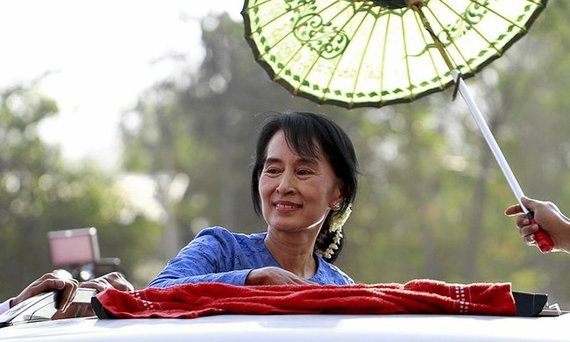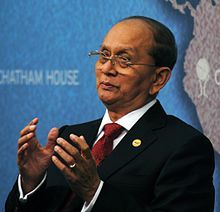Democracy leader Aung San Suu Kyi has been drawing rock star-sized crowds to her rallies this fall and even has a catchy hip-hop style campaign song. But will it be enough to overcome the machinations of the military-controlled government in Burma?
This is a historic moment in Burma, renamed Myanmar by military leaders. The first national election in 25 years is taking place this Sunday, Nov. 8. It could be a major step toward true reform. Or perhaps not.
In many ways, the election boils down to a high-stakes contest between "The Lady" and "The General." Former Nobel Peace Prize winner Aung San Suu Kyi is leading the opposition against the military-supported party of President Thein Sein, a former general who still believes the military knows best. Both turned 70 this year, but any similarity ends there.
Aung San Suu Kyi, once described as "an Asian Audrey Hepburn with the guts of General Patton," is known around the world for her long struggle to bring democracy to her country. She's made mistakes as a politician and can be difficult to deal with, but still has been drawing legions of fans.
Thein Sein has been described as looking like "an accountant in need of a Maalox" because he is balding, blinking and bespectacled. His mild-manner is deceptive. Thein Sein steadily rose in the military ranks by following the orders of the notorious General Than Shwe, who often made lists of "The World's Worst Dictators."
Thein Sein, the dutiful disciple, was assigned to preside over the partial opening in 2010 known as the "Burma Spring." On the positive side, he moved quickly to relax controls on investment, the media, labor unions and civil society. As a result, Burma has become the 13th fastest growing nation in the world. Now there are ATMs and sports bars with WiFi. Companies like Ford, Hilton and even Kentucky Fried Chicken have set up shop.
President Thein Sein (Wikipedia.org)
But on the negative side, Thein Sein has made sure all top government posts have stayed firmly in the grip of generals or former generals. He has stymied efforts to reduce the military quota of 25 percent of the Parliament seats.
He also has presided over the resurgence of religious violence and praised a radical Buddhist monk who has stirred up prejudice against Muslims. Thein Sein has been in charge while more than 100,000 Muslims known as Rohingya have been herded into squalid detention camps. A new report by Queen Mary University in London has documented that the Rohingya are being systematically persecuted as part of a state-sponsored genocide.
Corruption has continued unabated during Thein Sein's watch -- a recent Global Witness report documented that the military and its cronies have hauled in the profits from a staggering $31 billion in jade trade.
Repression has been ramped up in advance of the national election. More than 100 political prisoners languish in prison, including 10 journalists. Some 400 protesters are awaiting trial, including students who peacefully demonstrated for academic freedom.
Prospects for a credible, transparent and inclusive election were in doubt even before the balloting could begin. Suu Kyi's National League for Democracy (NLD) will need to win two-thirds of the open seats Sunday to gain a majority. That's a tall order in any case, but especially when former military leaders are running the election. Irregularities are already being reported in voter lists and advance voting.
Thein Sein has defended putting a foot on the democracy brake by saying, there has been enough change. "What more change do you want? If you want more, go for communism," he said.
While he is positioning himself for a second five-year term, Suu Kyi is blocked from serving as president by a Constitutional provision designed to thwart her. She still could play a decisive role in determining the next president as head of the majority party.
"We can't give you money, chicken, pork and solar power like the others," she told audiences, alluding to handouts being offered by the military supporters. Keep the bribes, she suggested, but vote for us.
Hundreds of election observers from around the world will be on hand to gauge the fairness of the Nov. 8 voting. But keeping an eye on balloting will be difficult in a country the size of Texas, with 50,000 polling stations.
That's where social media could play a major role, with cell phone video to document irregularities or violence. Cell phone penetration has gone from 1 percent to approximately 50 percent thanks to the new thaw. Facebook has become the face of the election with Thein Sein posting video of new ports and factories as well as stacks of cash being counted at new banks. As the election neared, he posted ominous warnings that if the military loses power, violence might erupt like the chaos that derailed the "Arab Spring."
Suu Kyi posted a video calling for calm, especially on election day. "Whoever provokes you, please exercise restraint," she cautioned. "If we win, don't cause a commotion," she said. "If we are unfortunate enough to lose, face the result with dignity."
The question then becomes, what will the Obama Administration do next? President Obama has considered the Burma transition part of his legacy, a key part of his "pivot to Asia." The White House has sent top advisers to Burma in recent weeks to underscore that how the elections are conducted will be crucial in determining whether remaining sanctions are removed.
The Administration will need to stay firm. Further improvements in military relations and expanded investment should depend on a good-faith ballot. Thein Sein's government hopes to open the Yangon Stock Exchange for business in December. If the election is rigged, sanctions could be reimposed and if large-scale violence breaks out, investors may re-examine the risk.
Rena Pederson is the author of "The Burma Spring," and a former speechwriter at The U.S. Department of State.

